Are you ready to unlock the secrets of your credit score? Brace yourself, because we’re about to dive headfirst into the wild world of credit ratings.
Like a rollercoaster ride through financial ups and downs, your credit score is influenced by a myriad of factors. From your payment history to recent credit inquiries, each piece of the puzzle plays a crucial role in determining your financial fate.
So hold on tight as we explore the top factors that can make or break your credit score journey.
Buckle up, my friend, it’s going to be one exhilarating ride!
Key Takeaways
- Paying bills on time is crucial for maintaining a good payment history.
- High utilization ratio can negatively impact your credit score.
- The length of your credit history is an important factor in determining your credit score.
- Having a mix of different types of credit can impact your credit score.
Payment History
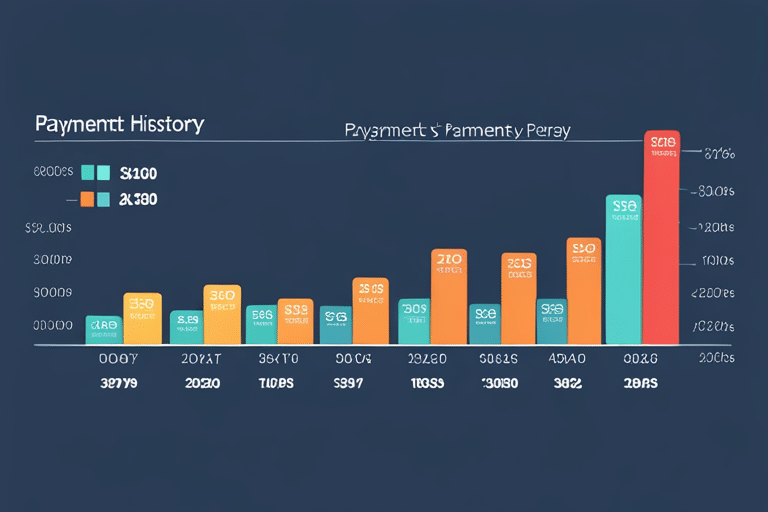
You need to make sure you’ve paid all your bills on time in order to maintain a good payment history. Let’s face it, nobody wants to be known as the ‘late payment champion.’
Picture this: you’re sitting at a fancy dinner party, sipping on a glass of champagne, when someone asks about your credit score. Suddenly, all eyes are on you as you sheepishly admit that late payments have been your Achilles’ heel. Awkward silence ensues.
Late payments can have a major impact on your credit score and financial reputation. It’s like getting slapped with an invisible scarlet letter for everyone in the financial world to see. Lenders and creditors view late payments as a sign of irresponsibility and unreliability. They start questioning whether they can trust you with their hard-earned money.
On-time payments, however, are like winning tickets to the credit score lottery. They show that you’re responsible, dependable, and financially savvy. Your creditworthiness shoots up faster than fireworks on the Fourth of July! Lenders will line up at your doorstep with offers for low-interest rates and desirable loan terms.
Think of it this way: paying your bills on time is like doing yoga for your credit score – it keeps everything balanced and stress-free. So, grab that calendar or set reminders on your phone because being punctual with your payments is key to maintaining a healthy financial life.
Credit Utilization Ratio

So you’ve been swiping that credit card like there’s no tomorrow, huh? Well, let me tell you something – your high utilization ratio is not doing your credit score any favors.
It’s like trying to fit into your skinny jeans after a buffet binge – it just ain’t pretty!
But fear not, my friend, for I have some strategies up my sleeve to help you lower that ratio and get back on track to financial bliss.
Impact of High Utilization
One of the factors that can significantly impact your credit score is high utilization. This refers to the amount of credit you are using compared to your total available credit limit. When your utilization ratio is high, it sends a signal to lenders and creditors that you may be relying too heavily on credit and could potentially be at risk of defaulting on your payments.
To understand the impact of high utilization, let’s take a look at a table:
| Credit Limit | Current Balance | Utilization Ratio |
|---|---|---|
| $10,000 | $5,000 | 50% |
| $20,000 | $2,000 | 10% |
| $5,000 | $4,500 | 90% |
As you can see from the table above, having a high utilization ratio can have a negative effect on your credit score. Lenders generally prefer to see a lower ratio as it indicates responsible credit management.
Fortunately, there are strategies you can employ to lower this ratio and improve your credit score. These include paying down debts, increasing your credit limit or applying for new lines of credit. By taking these steps and keeping a close eye on your utilization ratio, you can positively impact your overall financial health and increase your chances of being approved for future loans or lines of credit.
Strategies to Lower Ratio
To lower your utilization ratio, consider paying down debts, increasing your credit limit, or applying for new lines of credit.
Ah, the never-ending battle with credit card debt! Don’t worry, my friend, I’ve got some strategies up my sleeve to help you improve that credit score of yours. Ready? Here we go:
- Attack those debts like a ninja on a mission!
- Call up your credit card company and ask for a higher limit. It’s worth a shot!
- Consider getting yourself another shiny new line of credit. Just be sure to use it responsibly.
- And hey, don’t forget about those hidden gems called balance transfers. They can work wonders.
Length of Credit History

The length of your credit history, which includes the age of your oldest account and the average age of all your accounts, is an important factor in determining your credit score. So, how does the age of your credit affect your financial reputation? Let’s dive into the impact of credit age and discover the benefits of having a long credit history.
Imagine two individuals: Credit Carl and Newbie Nancy. Carl has been diligently building his credit for over a decade, while Nancy just started her financial journey six months ago. Now let’s take a look at their credit profiles:
| Credit Profile | Credit Carl | Newbie Nancy |
|---|---|---|
| Oldest Account Age | 10 years | 6 months |
| Average Account Age | 7 years | 6 months |
While Nancy may be enthusiastic about her new accounts, it’s clear that Carl has the advantage when it comes to his credit history. Lenders appreciate a longer track record because it shows that you have successfully managed debt over time. It demonstrates stability and responsibility—qualities lenders find attractive.
Having a long credit history also gives you more room for error. If you make a mistake or miss a payment here and there (which we’ve all done), those minor slip-ups will have less impact on your overall score if they are spread out over many years.
Now that you understand the importance of credit age, let’s explore another factor that influences your credit score: types of credit used
Types of Credit Used
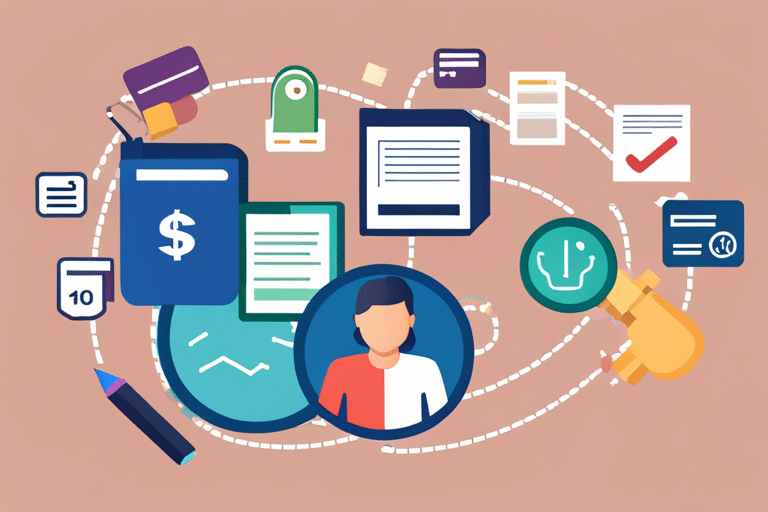
So, you’re wondering about the difference between using a credit card and taking out a loan, huh?
Well, let me tell you, it’s like trying to decide between a roller coaster and a merry-go-round. Sure, both can give you an adrenaline rush (or in the case of loans, some financial relief), but they work in completely different ways.
And when it comes to diversification, think of it as adding toppings to your favorite ice cream sundae – the more flavors you have, the better it tastes! In other words, having a mix of credit cards and loans can actually help boost your credit score by showing lenders that you can handle different types of debt responsibly.
Credit Card Vs. Loan
Credit card utilization and loan repayment history are key factors that impact your credit score. Let’s dive into the world of credit cards versus loans, shall we? Here’s a little comparison to help you understand the differences and how they can affect your financial life:
-
Credit Card Rewards: Ah, the allure of freebies! Credit cards often come with rewards programs, allowing you to earn points or cash back on your purchases. It’s like getting a little bonus for using plastic instead of cash.
-
Loan Interest Rates: Loans, on the other hand, usually have fixed interest rates. This means that you’ll know exactly how much you’re paying in interest over the life of the loan. It may not be as exciting as credit card rewards, but hey, at least it won’t surprise you.
-
Spending Control: Credit cards can be dangerous if not used responsibly. It’s easy to get carried away with all those shiny perks and end up buried in debt. With loans, however, there is typically a set amount borrowed, which can help keep your spending in check.
-
Payment Flexibility: When it comes to making payments, credit cards offer a minimum payment option. While this may seem convenient at first glance (helloooo shopping spree!), it can lead to high interest charges if not paid off in full each month. Loans often have fixed monthly payments that ensure steady progress towards paying off your debt.
Impact of Diversification
Diversifying your financial portfolio can have a significant impact on your overall financial stability and success. Imagine putting all your eggs in one basket. What happens if that basket falls? You’re left with a mess of broken eggs and no omelette to show for it.
The same goes for your investments. If you concentrate all your funds in one area, like stocks or real estate, you’re exposing yourself to unnecessary risk. Diversification is like having multiple baskets, each filled with different types of investments. By spreading out your money, you reduce the impact of concentration and increase the potential for growth.
It’s like having a diversified buffet instead of just eating the same meal every day – more variety and less chance of getting bored (or going hungry).
Speaking of hunger, let’s move on to recent credit inquiries…
Recent Credit Inquiries

Recent credit inquiries can impact your credit score. Yes, you heard it right! That innocent little inquiry you made to check your credit card balance or apply for a new loan could potentially affect your precious credit score. It’s like the butterfly effect of the financial world – one tiny action can cause a ripple effect that reaches far and wide.
So, before you go on an inquiry spree, here are some things you should know:
-
Hard vs. Soft Inquiries: Not all inquiries are created equal. Hard inquiries occur when a lender checks your credit as part of a loan or credit application process. These can have a negative impact on your score because they suggest that you’re actively seeking new credit. On the other hand, soft inquiries, like those made by employers or for pre-approved offers, don’t affect your score at all. Phew!
-
Time is of the Essence: The impact of recent inquiries on your credit score tends to diminish over time. So while one inquiry might not be a big deal, multiple inquiries within a short period can raise red flags for lenders.
-
Monitoring is Key: Keeping an eye on your credit report and monitoring any new inquiries is crucial in maintaining a healthy credit score. By regularly checking for unauthorized or unfamiliar inquiries, you can catch potential fraud early and take steps to protect yourself.
-
Inquiry Shopping Spree: Did you know that multiple inquiries made within a specific timeframe (usually 14-45 days) for certain types of loans – like auto or mortgage loans – are treated as a single inquiry? This means that if you’re shopping around for the best rate on these types of loans, it won’t hurt your score as much.
Public Records and Collections
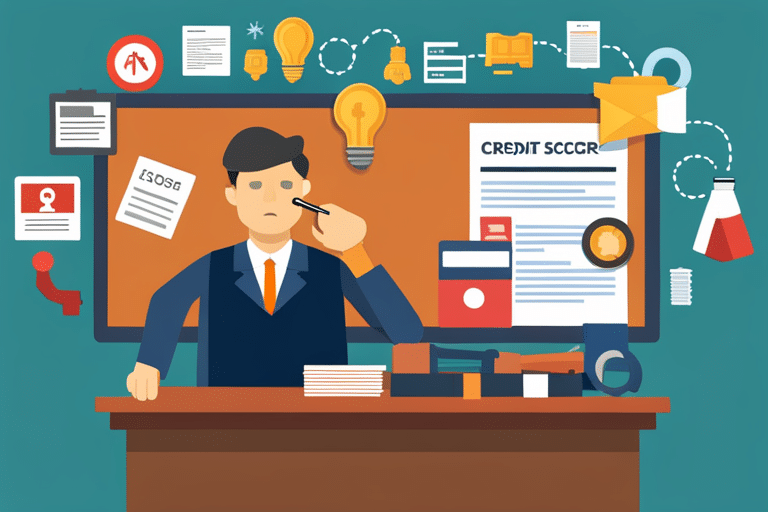
Public records and collections can have a significant impact on your overall financial health. Who would’ve thought that a speeding ticket or an unpaid medical bill could come back to bite you in the credit score? It’s like getting slapped with a double whammy – not only do you have to deal with the consequences of your actions, but now it’s affecting your ability to get approved for loans or credit cards. Talk about adding insult to injury!
Let’s start with public records. These are basically any legal documents that are available for public viewing, like bankruptcies, tax liens, or judgments against you. It’s like having your dirty laundry aired out for everyone to see. And trust me, lenders don’t want to see a pile of dirty laundry when they’re considering whether or not to lend you money.
Collections, on the other hand, are debts that have been handed over to third-party collection agencies because you haven’t paid them off. These guys are relentless – they’ll hound you day and night until you cough up the dough. But here’s the kicker: even if you do pay off those collections, they can still linger on your credit report for up to seven years! Talk about holding a grudge.
So how do these public records and collections affect your credit? Well, they basically scream ‘financial irresponsibility’ to lenders. They raise red flags and make them question whether or not you’ll be able to handle future debt obligations. And let me tell ya, lenders aren’t exactly keen on giving money to someone who has a track record of not paying their bills.
In short, keep an eye on those public records and collections because they can seriously mess with your financial standing. And remember folks, it’s always better to stay on top of your bills and avoid any legal trouble in the first place. Your credit score will thank you later!
Credit Limits and Balances
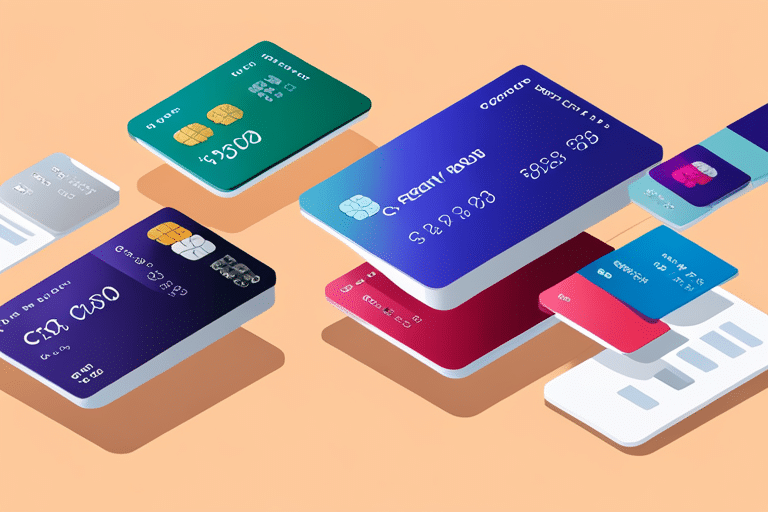
When it comes to credit limits and balances, it’s important to keep track of your spending habits and make sure you’re not maxing out your available credit. Sure, the temptation to splurge on that new gaming console or designer handbag might be strong, but remember, responsible credit utilization is key!
So, let’s dive into the world of credit card limits and how they can affect your financial well-being.
Here are a few things you should know:
-
Credit Utilization: This fancy term refers to the percentage of your available credit that you’re actually using. Ideally, you want to keep this number below 30%. Think of it as trying not to eat an entire pizza by yourself; moderation is key!
-
The Goldilocks Zone: Just like Goldilocks searching for the perfect porridge temperature, finding the right balance with your credit limit can be crucial. Too high? You risk overspending and getting into debt. Too low? Your credit utilization might skyrocket! Aim for a limit that suits your needs without tempting you too much.
-
A Word on Balances: A high balance on your card can hurt your credit score even if you’re making regular payments. It’s like having a giant weight hanging over your head while doing a tightrope walk – not ideal!
-
The Power of Negotiation: Did you know that you can often negotiate a higher limit with your credit card issuer? Don’t be afraid to ask! Just remember, with great power comes great responsibility (and self-control).
Debt-To-Income Ratio

So, you’ve got your credit limits and balances under control. But what about your debt-to-income ratio? Let’s talk about the impact of having a high ratio. It’s like trying to fit into skinny jeans after a Thanksgiving feast.
We’ll also explore the ideal debt-to-income ratio that lenders love. Because let’s face it, they’re the ones holding the keys to your dream home.
And fear not, my friend, for I shall reveal some ways to improve that ratio faster than you can say ‘I need a raise!’
Impact of High Ratio
If you have a high credit utilization ratio, it can negatively impact your credit score. But fear not, dear reader! There are strategies you can employ to lower this pesky ratio and boost your creditworthiness.
Here’s a handy-dandy bullet list of tips to get you started:
-
Pay off those outstanding balances: It’s time to bust out the piggy bank or start hunting for loose change under the couch cushions. Every little bit helps!
-
Increase your credit limit: Call up your friendly neighborhood credit card company and ask for a limit increase. Just be careful not to go on a spending spree once they grant your wish.
-
Be vigilant with payments: Paying your bills on time is like giving your credit score a warm hug. So set reminders, use automatic payments, do whatever it takes to avoid late fees and tarnished scores.
-
Diversify your debt: Don’t put all your financial eggs in one basket. Consider different types of loans or lines of credit to show that you’re responsible with various forms of borrowing.
Ideal Debt-To-Income Ratio
The ideal debt-to-income ratio is a key factor in determining your financial stability. It’s like the perfect balance between eating your favorite pizza and fitting into those skinny jeans you’ve been eyeing.
You see, this magical ratio represents how much of your income goes towards paying off debts each month. A low ratio means you have more money to spend on things that bring you joy, while a high ratio can leave you drowning in debt like a fish out of water.
Picture yourself trying to walk on land with fins instead of feet – not a pretty sight, right? Well, having a high debt-to-income ratio can have a similar impact on your financial well-being.
Ways to Improve Ratio
Improve your debt-to-income ratio by increasing your income or paying off debts. It’s time to take control of your financial situation and boost that credit score!
Here are some fun and effective ways to improve your credit utilization:
- Get a side hustle: Turn your passion into profit and watch your income soar!
- Create a budget: Take a deep dive into your expenses and find clever ways to trim the fat.
- Negotiate with creditors: Don’t be afraid to flex those negotiation skills and ask for lower interest rates or payment plans that work for you.
- Snowball method: Start by paying off smaller debts first, then roll those payments into larger ones. You’ll gain momentum faster than a snowball rolling downhill!
Number of Open Accounts

You should be aware that having a high number of open accounts can positively impact your credit score. I know what you’re thinking – ‘How on earth can juggling multiple accounts be good for my credit?’ Well, buckle up because I’m about to drop some knowledge bombs on you.
Having multiple open accounts shows lenders that you are responsible and capable of managing different financial obligations. It’s like being the ringmaster of your own credit circus, effortlessly balancing all those spinning plates. And let me tell you, lenders love a good show!
But here’s the catch – it’s not just about having a high number of open accounts; it’s also about how you manage them. You need to be like a master chef in the kitchen, carefully measuring each ingredient and ensuring they all work together harmoniously.
Now, don’t go running out and opening 20 new credit cards just yet. That won’t do you any favors. Remember, moderation is key here. You want to have enough accounts to show responsibility but not so many that it becomes overwhelming.
So how does this impact your credit score? Well, when lenders see that you have successfully managed multiple accounts, they view you as less risky and more likely to repay your debts. It’s like getting a gold star on your report card – except this time it actually matters!
Credit Mix
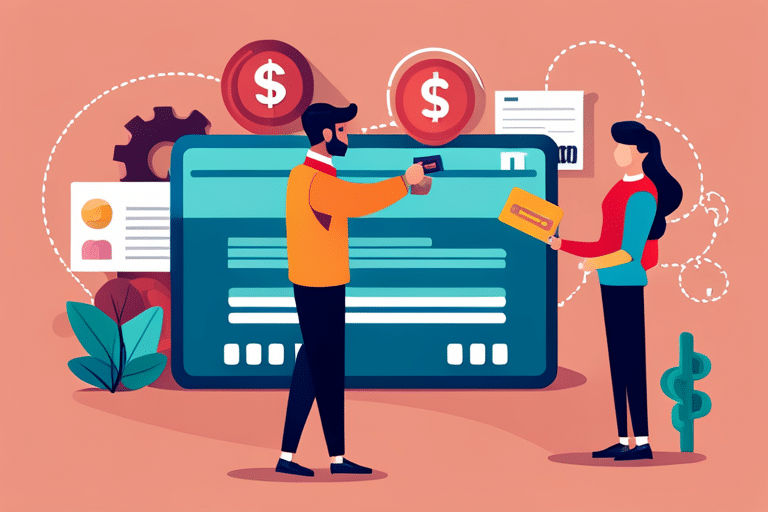
Now, let’s talk about why having a diverse credit mix is important for your overall financial health.
You see, your credit mix plays a crucial role in determining your credit score. It’s like having a balanced diet for your financial well-being. Just like you need a variety of nutrients to stay healthy, you need different types of credit to maintain a good credit score.
Here are four reasons why having a diverse credit mix can have a positive impact on your credit score:
-
Boosts Your Creditworthiness: Lenders want to see that you can handle different types of debt responsibly. Having a mix of revolving accounts (like credit cards) and installment loans (like mortgages or car loans) shows that you can manage various financial obligations.
-
Demonstrates Financial Responsibility: A diverse credit mix shows that you’re not relying on one type of loan just to get by. It indicates that you’re capable of handling different financial responsibilities simultaneously.
-
Reduces Risk: If all your accounts belong to the same category, such as only having multiple credit cards, it may signal potential risk to lenders. On the other hand, if you have different types of accounts and are successfully managing them, it lowers the perceived risk associated with lending money to you.
-
Improves Credit Score Calculation: The FICO scoring model considers your ability to manage various types of debt when calculating your credit score. So, having a diverse credit mix gives you more opportunities to earn points and improve your score.
Late or Missed Payments
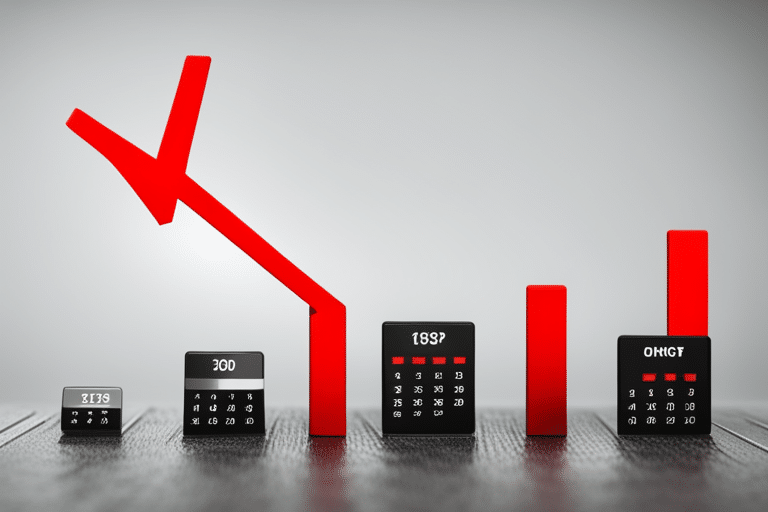
Late or missed payments can have a significant impact on your overall credit health and may result in a decrease in your credit score. Picture this: you’re at the checkout counter, about to pay for that fancy new gadget you’ve been eyeing. But wait! Your wallet is empty, and your bank account resembles a barren desert. Panic sets in as you realize that bill payment slipped through the cracks of your busy life. Uh-oh!
Late or missed payments are like little monsters lurking under your bed, waiting to pounce on your credit score when you least expect it. These pesky creatures have the power to turn a gleaming 800 into an abysmal 500 quicker than you can say “credit counseling”! Don’t believe me? Take a look at this handy table below:
| Credit Score Impact | Late Payment | Missed Payment |
|---|---|---|
| Excellent (800+) | Decrease by 90-110 points | Decrease by 120-140 points |
| Good (700-799) | Decrease by 70-90 points | Decrease by 100-120 points |
| Fair (600-699) | Decrease by 50-70 points | Decrease by 80-100 points |
| Poor (500-599) | Decrease by 30-50 points | Further decrease of around 150+ points |
| Very Poor/Bad (Below 500) | Further decrease of around 150+ | Further decrease of around 200+ |
Yikes! Those numbers speak for themselves. The consequences of late or missed payments are no laughing matter when it comes to your credit score.
But fear not! There’s hope for redemption through credit repair. By taking swift action and making on-time payments, you can start undoing the damage caused by those sneaky little monsters. And if you find yourself overwhelmed, don’t hesitate to seek credit counseling. With their expertise, you’ll be back on track to credit greatness in no time.
Credit Age and New Accounts

Adding new accounts to your credit history can impact the age of your credit and potentially affect your overall credit health. It’s like adding a new ingredient to a recipe you’ve been perfecting for years. Your credit age is like the secret sauce that lenders use to determine your creditworthiness, so it’s important to understand how new accounts can shake things up.
Here are four things you should keep in mind when it comes to the impact of new accounts on your credit age:
-
The New Kid on the Block: When you open a new account, it becomes the youngest member of your credit family. This means that it brings down the average age of all your accounts, which might not bode well for your credit score.
-
Fresh Start or Fresh Trouble: While opening a new account can give you a fresh start and increase your available credit, it also means more temptation to spend. Be careful not to go overboard and end up drowning in debt.
-
The Waiting Game: Time is key when it comes to building good credit. The longer an account has been open, the more weight it carries in determining your overall creditworthiness. So think twice before closing older accounts just because they’re not getting much action.
-
Mixology Matters: Lenders love diversity! Having different types of accounts—like a mortgage, car loan, and credit cards—can show that you’re responsible with different kinds of debt. So don’t be afraid to mix things up!
Remember that while adding new accounts can impact the age of your credit, managing them responsibly is what truly matters for maintaining good financial health. So choose wisely and let those newly added accounts work their magic without wreaking havoc on your overall creditworthiness!
Frequently Asked Questions
How Can I Improve My Credit Score if I Have a History of Late Payments?
If you’ve had late payments in the past and want to improve your credit score, there are ways to build credit. Take steps to repair your credit by paying bills on time and reducing debt.
Can Checking My Credit Score Frequently Have a Negative Impact on My Credit Score?
Checking your credit score frequently won’t have a negative impact. It’s important for credit score monitoring. Just be aware that multiple credit inquiries within a short period can temporarily lower your score.
Does Having a High Credit Limit Affect My Credit Score Positively or Negatively?
Having a high credit limit can positively affect your credit score. Lenders consider factors like credit utilization, which is the percentage of your available credit that you’re using. So, having more available credit can lower your utilization and boost your score!
How Long Does It Take for a Missed Payment to Show up on My Credit Report?
Missing a payment can quickly and negatively affect your credit score. How long it takes to show up on your report depends, but don’t wait around! Minimize the impact by staying organized and making timely payments.
Will Closing Unused Credit Card Accounts Improve My Credit Score?
Closing unused credit card accounts can potentially improve your credit score. By reducing the amount of available credit, you lower your overall credit utilization ratio. However, it’s important to consider other factors that affect your score as well.
Conclusion
So there you have it, my friend! Remember, your credit score is like a sly serpent, slithering through the financial jungle.
Pay your bills promptly and keep that credit utilization ratio low to tame this beast.
Nurture a long credit history like a nurturing nanny nurturing newborns.
Diversify your credit portfolio like a daring daredevil diving into dangerous depths.
And beware of too many recent credit inquiries, for they can be as pesky as persistent mosquitoes.
So go forth and conquer those credit monsters with wisdom and wit!

